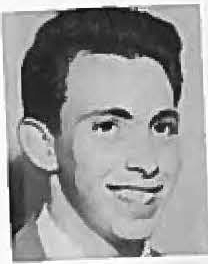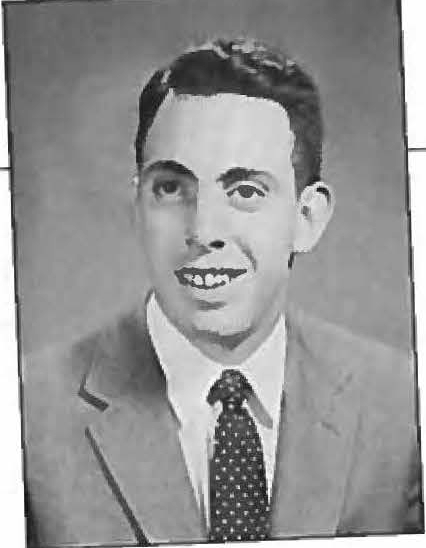Amherst Magazine Peter D. Ribicoff '59
Skip to Main Content25th Reunion
This material has been written without use of a computer. I have not yet become a part of the computer age. Also, I do not have a photo to add nor would I know how to send it if I did have one. I assure you that I look about the same as I did almost fifty years ago. I hope to join you next year so you can see for yourself.
Spouse: Mercedes Haziot Ribicoff. We married in July 1961. She is a practicing psychoanalyst/psychotherapist.
Children: My audio/visual progeny include: Jacob (45), a sound editor for films, who has two children, Gabriel (8) and Benjamin (6); Judith (41 ), a painter and Art teacher, who has one child, Jonah (5). Between Jake and Judith we had a beautiful daughter, Ruth Rose, who died of crib death (cause unknown) when she was only seven weeks old, a flower plucked before she bloomed.
Amherst to present.

My first full-time job was teaching high school English in Alameda, California, near Oakland where l remained for one school year. During that year I met the love of my Iife, Mercedes Hazlot, at a Passover Seder in Apnl1961 . We were married that July, a classic case of love at first sight.
During that summer we traveled back east by car to Washington D.C. where I taught high school History for the 1961-62 school year.

I had come to realize that the high school students which interested me most were the ones who seemed incorrigible in terms of behavior and cooperation as well as those who sat at their desks like vegetables doing nothing beyond writing their names on otherwise blank paper which they turned in as tests or assignments. In other, words the kids who the schools failed were the ones I wanted to help. I looked elsewhere for programs which served these kids. In 1963 I found one called the Youth Opportunity Center in the Hunter's Point. section of San Francisco, an isolated ghetto in the housing projects built during World War 11 for shipyard workers. My job was to work with adolescents in Hunter's Point who were in the caseloads of the San Francisco Public Welfare Department. Some were children of welfare recipients. Others were recipients themselves as single mothers. My job was to steer them into constructive programs leading to a high school diploma or a steady job and provide the support services needed to keep them in the program. Our office was located in the heart of Hunter’s Point. I became part of that community and learned volumes about a slice of life to which I had never been exposed.
In 1965 I was offered a job in New Haven. I had been thinking of how I missed the four seasons in New England and accepted it. I became the coordinator of a skill center which ran programs for both youth and adults. The entire organization was called Community Progress, Inc. (CPI) and included a variety of programs and community centers in the impoverished neighborhoods of New Haven. lt was one of the premier experimental programs in the nation which led to the antipoverty programs of the Sixties and Seventies. In May of 1965 my daughter, Ruth Rose, was born and died that July. I stayed at CPI through the summer of 1966 and then we moved into my parents' summerhouse in New London, Conn.
We stayed in New London through the summer of 1967. I began my first novel, Return to Gilgal. At that point, writing novels was still my primary goal in life. While in New London, my daughter, Judith, was born in February of 1966. By that summer, living year-round in a summerhouse had worn thin. We decided to take a bite of the "Big Apple" and moved to NYC in the fall of 1967. We found a rent-controlled apartment near Central Park, a great place where we still live to this day. I completed my novel in 1968. It made the rounds of the publishers and agents where it was greeted with a unanimously unsympathetic response.
In 1970 I went to work at Fordham University in its Higher Education Opportunities Program (HEOP). This program was for students from impoverished neighborhoods in NYC who showed potential but lacked the basic academic skills to make it in college due to having graduated from incompetent city high schools. I provided counseling and tutoring and after a couple of years instituted a basic writing skills course to enable them to cope with written assignments on a college level. In 1973 I completed my second novel, A Cry From Babylon. It was received in a manner similar to the first novel. I remained at Fordham through the spring semester of 1978. By the end of that summer, I had completed my third novel, The Sabbath Money Sack, which went the way of its predecessors.
In the fall of 1978 I went to work for a nonprofit organization called Wildcat Service Corporation, also in NYC. Wildcat runs "supported work" programs for ex-offenders, former substance abusers, long-term welfare recipients, and youth who have dropped out of school. They are sent out on work crews around the city and earn actual paychecks at minimum wage or more. These are people devoid of work skills and work experience. Their supervisors are Wildcat staff members. They learn good work habits, "life skills", and a variety of things many other people learn by osmosis and take for granted. (Example: How to tell time and get up when the alarm rings; how to work under supervision rather than fighting and getting fired.) My job was to write grant proposals to help fund the programs. While at Wildcat I managed to obtain millions of dollars in grants for program support. I remained at Wildcat through 1987.
In 1988 I went to work at Covenant House, also a nonprofit organization, that works with homeless youth ages 16-21 providing food and shelter and enrolling them in a variety of programs leading to their becoming self-sufficient. lt runs shelters and programs in 14 USA cities, two Canadian cities, and four cities in Latin America. My job began by writing grant proposals for the NYC program. Then I moved to the "corporate headquarters" in NYC from where I helped all the sites identify government funding opportunities and provided technical assistance in preparing grant proposals. While at Covenant House, I helped bring in tens of millions of dollars in government grants. I also added advocacy to my duties. In this capacity I worked with members of Congress and their staffs to pass legislation beneficial to homeless youth and reject such legislation which was detrimental. (Who wouldn't want to help homeless youth? We warmed some cold hearts in Washington.) Thus I came full-circle back to politics where it all began. I retired from Covenant House in 2002 after 14 fulfilling years.
So what does it all mean? The final chapter is far from written. Now that I am retired, I have turned my attention to another novel. It has been 30 years since I finished the last one. Much has happened and this one should not only be better but above all, different. My experiences have shown me that Democracy exists in America mainly in school textbooks where the children of our citizens are brainwashed into thinking that greed and conspicuous consumption really are Democracy's fruits. Each time I came to a fork in the road and had the opportunity to choose the path to fame and fortune I chose the other one leading to public service. I haven't made much money, but I don't owe any money either. I have a wonderful family, I've enabled some people to Improve their lives, and I can stll improve my own by playing and listening to music, looking at art, and reading a book-even if it isn't mine.